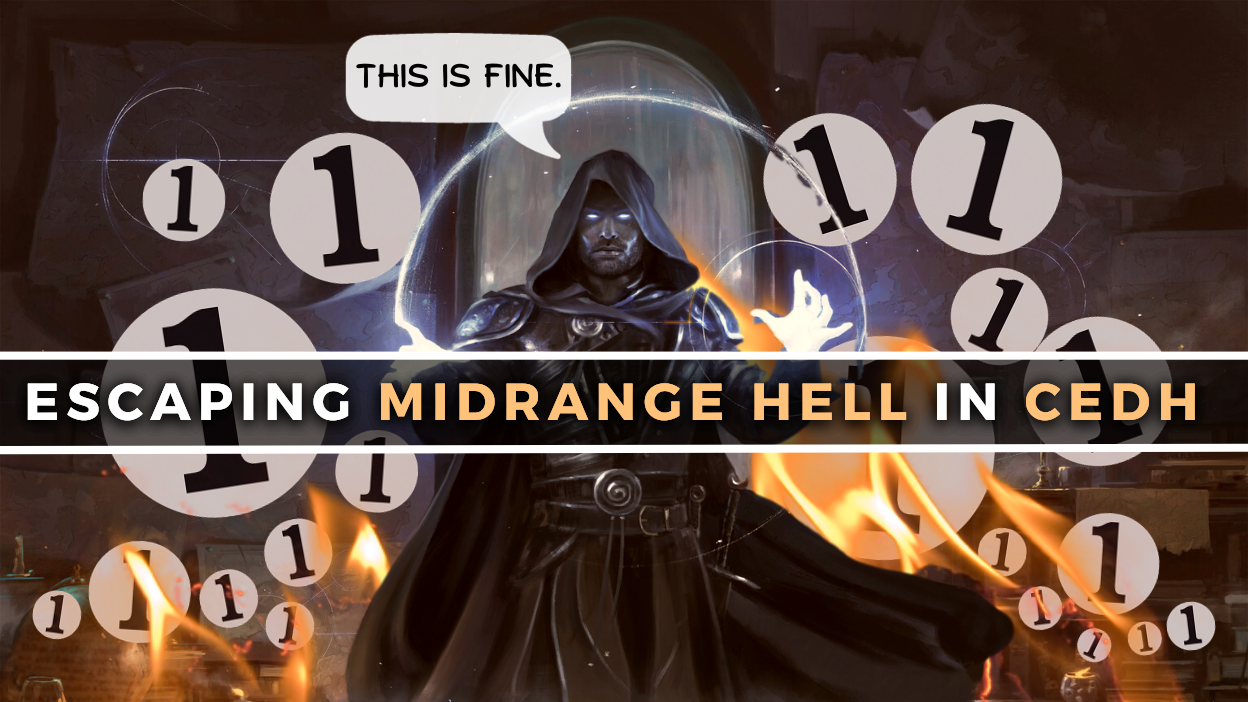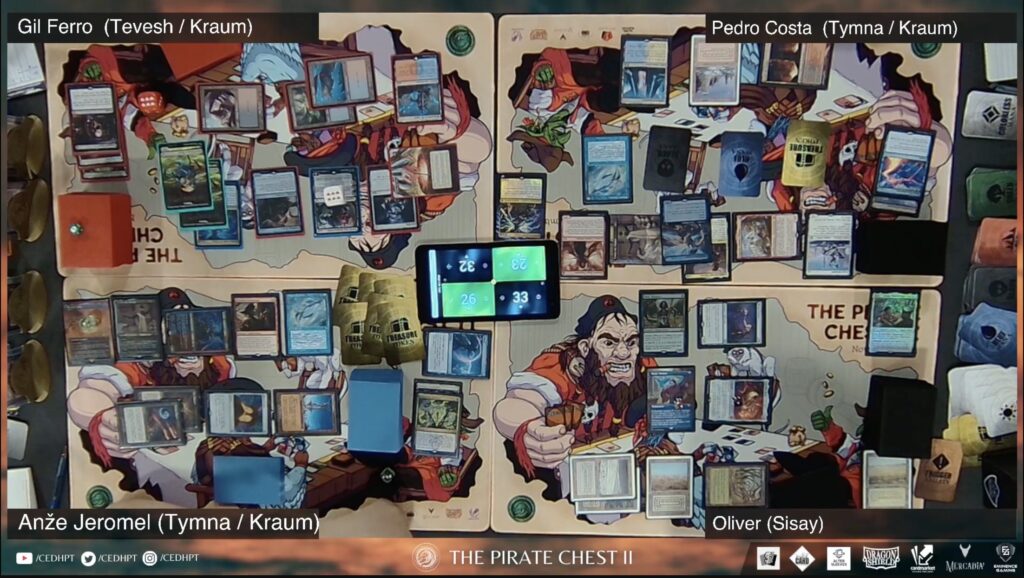Escaping Midrange Hell in cEDH

In 2024, cEDH players live in Midrange Hell.
Feel the flames with me.
I'm watching the final match of a cEDH tournament. The game is on its fourth turn. On the battlefield are:
- 3 Mystic Remoras
- 2 The One Rings
- 2 Tymna the Weaver
- 1 Kraum, Ludevic's Opus
- 1 Esper Sentinel
- 1 Faerie Mastermind
- 1 Lotho, Corrupt Shirriff
- 1 Tevesh Szat, Doom of Fools + Displacer Kitten

After the fourth Mystic Remora hit the board, the players agreed to restart the game. This is a normal occurrence in Portuguese cEDH tournaments, so much so that tournament organizers instituted this rule to ensure tournaments leave venues on time.
For the past few years, Top 4 tables at cEDH tournaments across the world regularly feature 2+ hour-long games. These pods are defined by Midrange decks using passive advantage engines to draw lots of cards, then win from a doubly or triply protected position. A quick glance at edhtop16.com reveals the prevalence of Midrange decks among cEDH's top performers: Turbo and Control, in the form of Stax, like Winota, or draw-go decks, like Talion, are very underrepresented at the top of the format, yet these games are not confined to tournaments' top tables; according to Datatog, the rate of draws in Swiss rounds is rising.
Regarding 3: Over the past 9 months we have a draw rate of about 14.6% in cEDH tournaments. It rose from around 11% to around 16% over this period. There were events with draw rates of 40+%. Byes get stronger in events, where wins are rarer. pic.twitter.com/46FW5XZKZ9
— Datatog (@datatog) January 2, 2024
Hence the moniker: Midrange Hell. Games are slow, conversation-laden, trigger-happy, exhausting, and often anti-climatic.
Is there a route out of Midrange Hell? Or is this the tournament cEDH meta we should expect for years to come? We'll investigate these questions.
Let's start by greeting the elephant in the room: the principal cause of our situation, cEDH's arch-engine, and a card whom many dub infernal, is Rhystic Study.
The Number(s) of the Beast
Imagine you're playing Tymna Kraum Control, a.k.a. Blue Farm.
Your deck contains the following early routes to cardboard that crafts Midrange Hell: you prioritize casting Mystic Remora, Esper Sentinel, Rhystic Study, and/or The One Ring as early as possible, and your deck includes at least four tutors to find those cards; we'll call these 8 cards "Rhystic effects." Otherwise, your 98-card deck contains 48 mana sources and, for our purposes, 42 other cards.
The probability that your opening hand contains 3 or more mana sources and 1 or more Midrange Hell effect is 31.4%.
But remember: you know that finding and casting an early Rhystic effect will likely win you the game, and will very likely win you the game if any player in your pod plays recklessly or misunderstands Rhystic Study's dynamics.
So you mulligan appropriately. You mulligan three times, seeing four total hands. Your probability of finding an early Rhystic effect rises to 78.6%. In other words, with commonsensical deck construction and a bit of discipline, you will find a route to a passive card advantage engine nearly 80% of the time. In fact, you might even have one in your command zone!
Now imagine that all four players in a given pod know this. What is the probability that at least one player travels down the Rhystic road? 98.8%.
Hence the prevalence, popularity, and homogeneity of Midrange Hell.
Hot for Teacher
But what makes this Midrange situation so hellish? Are we just being hyperbolic when we use this term? Can't people just figure out how to deal with Rhystic Study and its ilk?
The practical reality is this: if cast on Turn 1 or Turn 2, Esper Sentinel, Mystic Remora, Rhystic Study, and/or The One Ring are likely to become win conditions. If cast in a pod with just one irresponsible or naive player, these cards are very likely to become win conditions.
While cards like Rhystic Study do not themselves say "win the game", like Thassa's Oracle, and while they don't provide a deterministic route to victory like, Underworld Breach + Brain Freeze, they accumulate tremendous resources so consistently that they essentially cause their controllers to win the game. As Matt Sperling estimates in a conversation with Rebell Son, a Turn-1 Rhystic Study will raise your win percentage to 70% or so.
As Matthew at Lemora's Cards says, cards like Rhystic Study punish players for taking game actions. These cards require the least input (mana, cards, skill) to produce the most output (mana, cards, winning lines). Furthermore, they convert opponents' misplays and miscalculations into their controllers' advantage more reliably than any other kind of Magic card.
An analogy might clarify the situation further. Imagine you're playing another multiplayer free-for-all game, like Fortnite. In this Rhystic-fied version of the game, your final three opponents need to hit the griddy immediately after firing each shot. If they don't press that emote button, you gain 10 health and 10 pieces of ammunition. This happens every time your opponents fire.
I repeat: Rhystic Study and its ilk are not just draw engines. They are win conditions.
Bat Out Of Hell
Very few players in cEDH play Bane of Progress. Nobody to my knowledge plays Back to Nature. Similarly, Collector Ouphe decks rarely show up in tournaments past the cut to Top 16.
Why? Because most cEDH players want to have their cake and eat it too. Our meta is defined by fast mana, early win attempts, and giant stacks. The pressure to keep up, in deck construction and play patterns, is real.
So, given the prevalence of Midrange Hell, can we escape it? What are our options?
- Don't play Rhystic effects. To cultivate a less hellish environment, players or tournament organizers could effectively self-regulate, house-banning Rhystic, et al. But in a meta whose mindset is play to win, doing so requires a great deal of coordination and discipline.
- Win the game before Midrange decks can stop you (or through their Rhystic Studies). This is a tough proposition because Turbo decks are incredibly skill-intensive and more often rely on good luck (i.e., beneficial variance) than other kinds of decks. They require intense focus in order to identify high-risk, narrow-margin plays. Add the fact that players can often mulligan effectively to disrupt an early Ad Nauseam with a free or 1-MV counterspell, and you'll see why very few Turbo decks make Top 4 tables (with some on-and-off exceptions, like Rograkh Silas). This leaves pilots with the tactic of using cards like Silence to protect their win conditions: if the Rhystic player has 30 cards in their hand but can't stop your Grand Abolisher, you're usually in the clear. Borne Upon a Wind also demonstrates the power of protecting your win via good timing and adequate resources. While cards like Ranger-Captain of Eos and Defense Grid are now common, I think cards like City of Solitude and Dosan the Falling Leaf will become more common among green decks, and color-agnostic cards, like Conqueror's Flail, will see more play across the board. Even Tidal Barracuda might be helpful!
- Disrupt Rhystic and its companions. I've listed cards1 that disrupt an early Mystic Remora, Esper Sentinel, or Rhystic Study (excluding cards with more specific inputs, like Fierce Guardianship). While many cEDH players would scoff at playing some of the cards on this list, I encourage them to ask themselves: how often would you like to lose to these cards? Much in the same way that sideboards were invented to prevent narrow strategies from dominating, perhaps more cards in a 100-card deck need to be dedicated to cEDH's most popular early win attempts. One could argue, though, that diluting a deck's total card quality (i.e., a rough sum of the efficiency and relevance of all cards in a deck) is a step in the wrong direction. Regardless of deck construction, players would also need to less frequently tap out on the earliest turns in order to hold up our disruptive plays. Holding a good card in your hand means nothing if you aren't able to use it.
- Talk with your opponents about not handing the Rhystic Study player the win. cEDH is a social game; talking requires no mana and doesn't use the stack. Matt Sperling recommends that you immediately chat with the table when an early Rhystic Study comes down to reduce that player's chance of winning. I believe that this should be a given, particularly since high-stakes cEDH games are defined along three axes: human behavior, deck construction, and tournament policy. If three players deny the Rhystic Study player any extra cards, they have successfully maintained higher individual probabilities of winning the game. Failing to have this conversation leaves money on the table. (You don't even have to get a tattoo!)
- Change tournament policy. The Japanese tournament organizer Hareruya disincentivizes draws with a unique points system. Presumably, policies, which are beyond the purview of the Rules Committee's banlist, could be formulated to help out Turbo decks in order to balance the cEDH meta. (Stax and other Control decks usually do well when games last beyond Turn 5, making these decks unwieldy propositions for tournament play.)
Heatseeker
cEDH is a game in which you must overcome a big resource disparity in order to win. This is done with some combination of luck and skill. When you cast a Rhystic Study and cards like it, you capitalize on your good luck, your opponents' bad luck, your skillfulness (particularly re: mulligans), and your opponents' inexperience and/or impatience. And all for the low, low cost of one to 3 mana. We cannot be surprised that games frequently revolve around these passive engines.
In order for us to properly combat cEDH's most popular and efficient win conditions, all we can do is change our decks or our behavior. Ideally, we do both.
If not? Enjoy the flames.
- Force of Will, Mindbreak Trap, Force of Negation, Force of Vigor, Commandeer, Daze, Mental Misstep, Abolish, Reverent Silence, Crash, Swan Song, Pyroblast, Red Elemental Blast, An Offer You Can't Refuse, Stubborn Denial, Force Spike, Mana Tithe, Spell Pierce, Minor Misstep, Nature's Claim, Quiet Purity, Light of Hope, Demystify, Break the Spell, Erase, Portable Hole, Prismatic Ending, Shattering Spree, Vandalblast, Gleeful Demolition, Overload, Oxidize, Hearth Charm, Crumble, Fragmentize, Natural State, Raze the Effigy, Lucky Offering, Reckless Air Strike, Deface, Smelt, Mogg Salvage, March of Otherworldly Light, Unmask, Thoughtseize, Inquisition of Kozilek, Duress, Despise, Shattered Dreams, Harsh Scrutiny, Lightning Bolt, Shock, and on and on and on. (If we added cards like The One Ring, Necropotence, Archivist of Oghma, Tymna, Kraum, and/or Talion, this list would be much longer.)